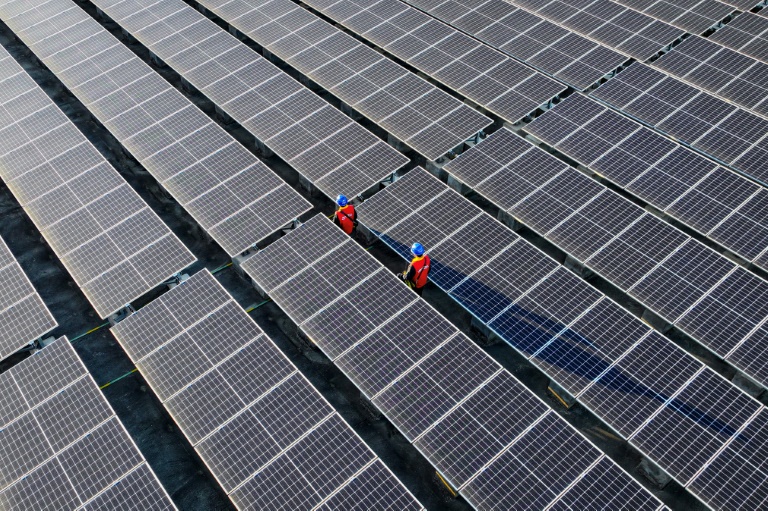In recent years, China has promoted global climate change countermeasures and expanded its manufacturing dominance into the clean energy industry, but this is starting to worry countries such as the United States and Europe.
The U.S. government is particularly concerned about “overcapacity,” where Chinese subsidies for industries such as solar power, electric vehicles and batteries could strain those industries in other countries.
U.S. Treasury Secretary Janet Yellen has vowed to raise the issue in a meeting with key Chinese officials this week.
Let's take a look at China's strength in these green technology areas.
– Advantage of the Sun –
China is the world's largest emitter of carbon dioxide and other greenhouse gases that cause climate change.
Wood Mackenzie said it is also pouring billions of dollars into green energy and will dominate the global solar supply chain.
China invested more than $130 billion in the solar power industry in 2023, according to a report by an analysis firm.
With these investments, “China will own more than 80% of the world's polysilicon, wafer, cell and module manufacturing capacity from 2023 to 2026,” Wood Mackenzie added, adding that China will own more than 80% of the world's polysilicon, wafer, cell and module manufacturing capacity from 2023 to 2026. The key materials were mentioned.
This is a concern for the US government as it seeks to reduce its dependence on China and increase production capacity to support its own green transition.
Yellen told reporters on Wednesday that beyond tax subsidies for green industries, she would not rule out other measures to protect them, such as trade barriers.
– Electric car –
China's automobile exports surged by 57.9% from the previous year, reaching a record high of 4.9 million units in 2023.
Sales of new energy vehicles (NEVs), including all-electric vehicles and plug-in hybrid vehicles, increased by 77.6% to 1.2 million units, state media reported, citing data from the China Association of Automobile Manufacturers (CAAM). This is said to have been pushed up by the fact that the ).
State media pointed out that China will account for more than 60% of global NEV sales in 2023.
Production of such vehicles also increased by about 36% last year to more than 9.6 million units, state media said.
– Battery Boost –
China's lithium-ion battery sector will also grow in 2023, with total production soaring 25% year-on-year, according to state media reports.
Meanwhile, exports of such batteries increased by 33% year-on-year in 2023, the report added.
According to the Economist Intelligence Unit, China will account for about 57% of global lithium-ion battery demand in 2022.
But there are also warnings that the industry is suffering from overcapacity.
– “Extreme discrepancy” –
Washington and Brussels are concerned that Chinese green technology companies, with their subsidy-driven production capacity and vast inventories, can offer very low prices to companies in the U.S. and Europe without trade barriers. will not be able to compete.
Jorg Wutke, honorary president of the European Union Chamber of Commerce and Industry in China, said: “Chinese industry's huge overcapacity is not only an economic challenge for an open economy, but also risks inducing protectionist forces in other countries. There is,” he said.
Yellen's visit to China this week is crucial in conveying this message to China's leaders, she told AFP.
China's manufacturing value added (the sector's net output) amounts to about 30%, far exceeding that of the United States and other developed countries.
But China, the world's second-largest economy, accounts for only 14% of global consumption, Wutke added, calling this an “extreme discrepancy.”
bys/Oho/Kan/Dan


